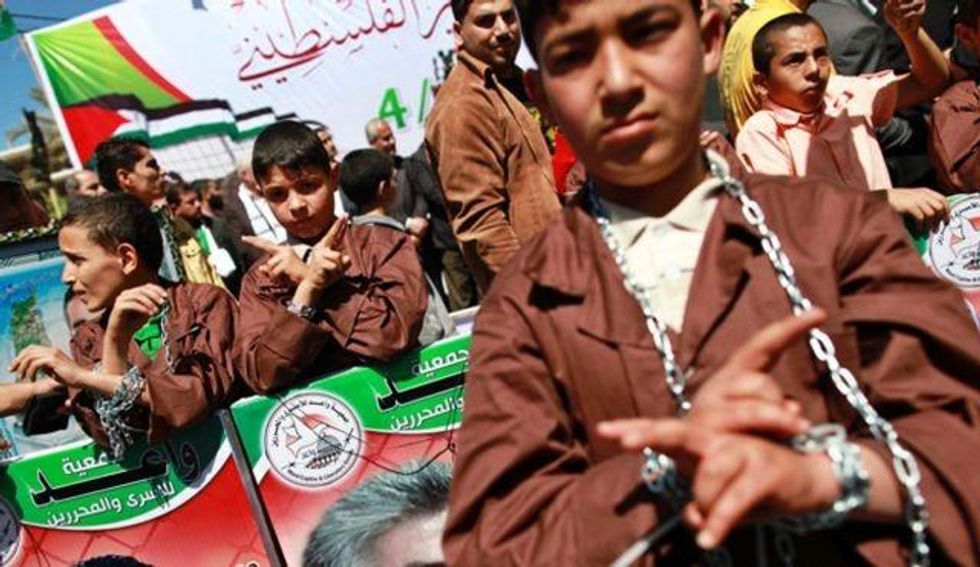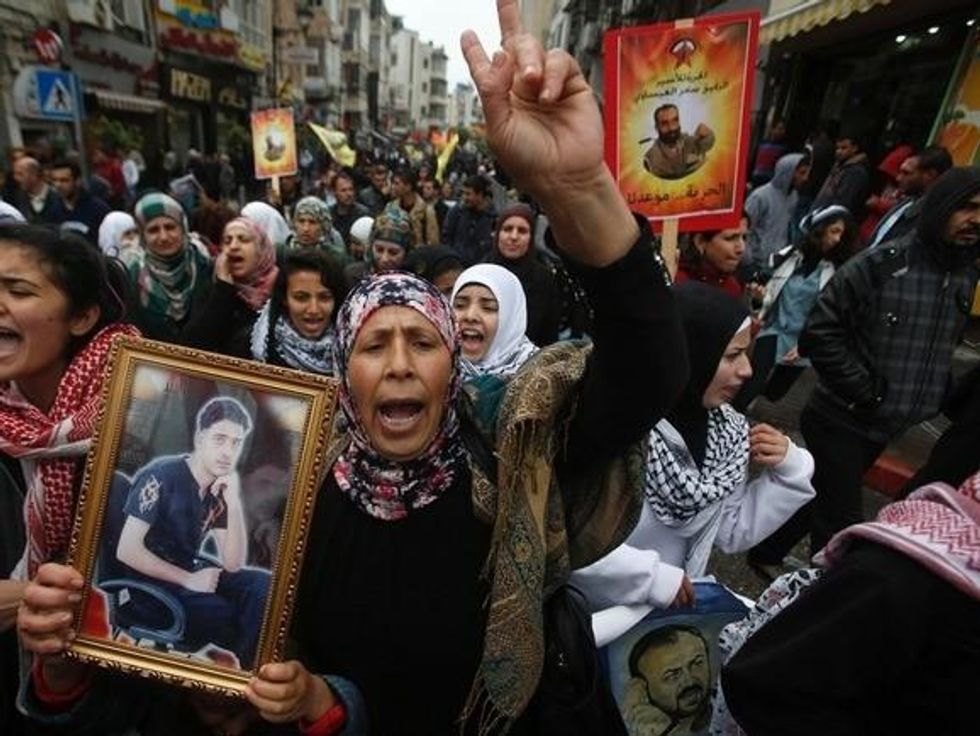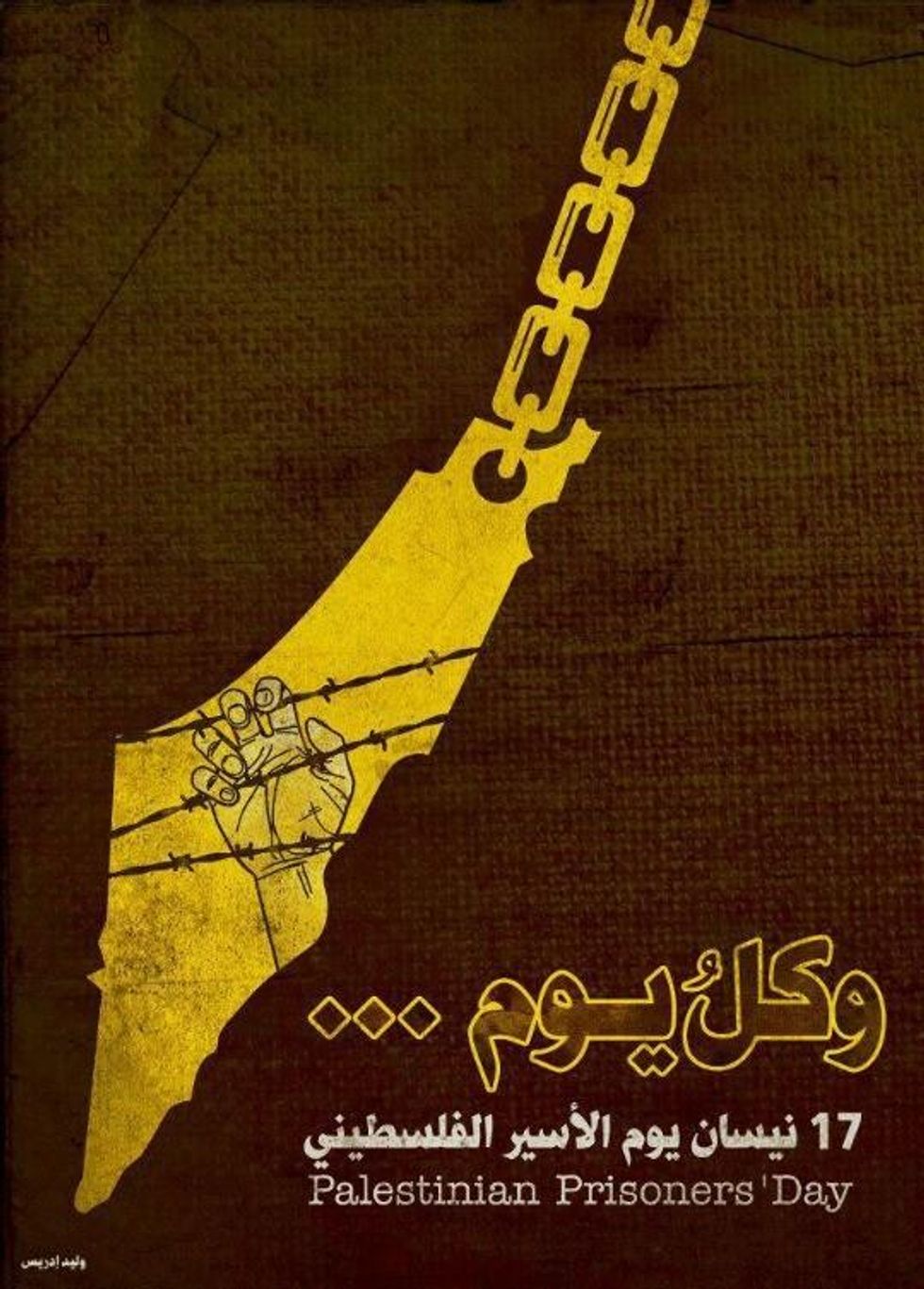

SUBSCRIBE TO OUR FREE NEWSLETTER
Daily news & progressive opinion—funded by the people, not the corporations—delivered straight to your inbox.
5
#000000
#FFFFFF
To donate by check, phone, or other method, see our More Ways to Give page.


Daily news & progressive opinion—funded by the people, not the corporations—delivered straight to your inbox.

Central to the protesters' concerns are the lives of multiple prisoners who continue long term hunger strikes behind bars, including Samer Issawi, who has been refusing food for well over 200 days and is now in critical condition.
In a letter to European Union foreign policy chief Catherine Ashton, Saeb Erekat, a senior Palestinian official, demanded "immediate and concrete steps" to secure the release of Issawi whose life "hangs in the balance", warning that his death would damage efforts to revive the peace process.
"The fate of Mr Issawi is being followed very closely by millions of Palestinians, Arabs and supporters of justice worldwide. The situation is potentially explosive and any harm that comes to him will undoubtedly lead to a serious eruption of violence that will make any sort of political progress unlikely," wrote Erekat on the eve of Prisoners' Day.
He added: "Should Mr Issawi die, we will ... hold the international community partly responsible for its tolerance of Israel's appalling actions which have created this terrible situation."
In a message to Israeli activists and intellectuals, posted last week on Facebook, Issawi wrote: "I invite you to visit me in the hospital and see me as a skeleton handcuffed to the bed. Three exhausted jailers around me eat and drink by my bed. The guards follow my pains and gradually growing weight loss. Occasionally they look at their watches and ask: 'How can such a body have anything left to survive?'
"If I die, it is a victory; if we are liberated, it is a victory, because either way I have refused to surrender to the Israeli occupation, its tyranny and arrogance." -Samer Issawi
In an article published by the Guardian last month, Issawi wrote that his hunger strike was "my last remaining stone to throw at the tyrants and jailers in the face of the racist occupation that humiliates our people ... If I die, it is a victory; if we are liberated, it is a victory, because either way I have refused to surrender to the Israeli occupation, its tyranny and arrogance."
Issawi recently wrote in a letter sent through his lawyer from his hospital bed. "Greetings to all without exception. I urge all the noble people of our Arab and Muslim nation as well as the free people of the world to turn April 17, 2013 into a day of rage and solidarity with Palestinian prisoners all over the world."
Roughly 169 Palestinians are currently held under "administrative detention" orders, an Israeli technique whereby prisoners are held indefinitely without having ever been charged for a crime.
The Center for Political and Development Studies reports that today 4750 Palestinians are detained in the Israeli jails including children, women, sick, the physically handicapped, the elderly, MPs and former ministers.
"They are held under very tough conditions where they are deprived of their basic rights and they are exposed to various forms of torture and treated inhumanely, all of which constitutes a grievous violation of international conventions and norms," the group writes.
The number of child prisoners hit 235 this year, with 35 of them under 16 years old.
Al Jazeera's El-Shamayleh reports today that since the start of the Israeli occupation in 1967, about 800,000 Palestinians have been detained at some point.
Read of full fact sheet of Israeli detention practices here.
Agence France-Press provides a rundown of the rallies throughout the day:
In the West Bank, around 600 relatives of prisoners gathered for a sit-in in the rain at Arafat Square in central Ramallah after which some of them were planning to march towards the nearby military prison at Ofer.
Another rally was being held in the northern city of Nablus.
Meanwhile in Gaza, hundreds of people were taking part in a march from central Gaza City to the offices of the International Committee of the Red Cross, an AFP correspondent said.
Another sit-in was to take place at Damascus Gate in east Jerusalem at 1400 GMT, officials said.
Events to mark Prisoners' Day began on Tuesday when youngsters in Gaza City released thousands of balloons into the air, each bearing the name of a prisoner, while there were also solidarity gatherings in Rafah in the south.
During the evening, demonstrators gathered in a village near the southern city of Hebron lit a "freedom torch" in front of the home of Arafat Jaradat, a prisoner who died in Israeli custody last month after several days of interrogation, sparking Palestinian allegations of torture.
"It was a symbolic event to deliver a clear message, firstly to the Israeli side and secondly to the international community, that it is intolerable for us to continue receiving our prisoners as corpses," Amjad al-Najjar, head of the Hebron branch of the Prisoners' Club, told Voice of Palestine radio.


_______________________
Dear Common Dreams reader, The U.S. is on a fast track to authoritarianism like nothing I've ever seen. Meanwhile, corporate news outlets are utterly capitulating to Trump, twisting their coverage to avoid drawing his ire while lining up to stuff cash in his pockets. That's why I believe that Common Dreams is doing the best and most consequential reporting that we've ever done. Our small but mighty team is a progressive reporting powerhouse, covering the news every day that the corporate media never will. Our mission has always been simple: To inform. To inspire. And to ignite change for the common good. Now here's the key piece that I want all our readers to understand: None of this would be possible without your financial support. That's not just some fundraising cliche. It's the absolute and literal truth. We don't accept corporate advertising and never will. We don't have a paywall because we don't think people should be blocked from critical news based on their ability to pay. Everything we do is funded by the donations of readers like you. Will you donate now to help power the nonprofit, independent reporting of Common Dreams? Thank you for being a vital member of our community. Together, we can keep independent journalism alive when it’s needed most. - Craig Brown, Co-founder |

Central to the protesters' concerns are the lives of multiple prisoners who continue long term hunger strikes behind bars, including Samer Issawi, who has been refusing food for well over 200 days and is now in critical condition.
In a letter to European Union foreign policy chief Catherine Ashton, Saeb Erekat, a senior Palestinian official, demanded "immediate and concrete steps" to secure the release of Issawi whose life "hangs in the balance", warning that his death would damage efforts to revive the peace process.
"The fate of Mr Issawi is being followed very closely by millions of Palestinians, Arabs and supporters of justice worldwide. The situation is potentially explosive and any harm that comes to him will undoubtedly lead to a serious eruption of violence that will make any sort of political progress unlikely," wrote Erekat on the eve of Prisoners' Day.
He added: "Should Mr Issawi die, we will ... hold the international community partly responsible for its tolerance of Israel's appalling actions which have created this terrible situation."
In a message to Israeli activists and intellectuals, posted last week on Facebook, Issawi wrote: "I invite you to visit me in the hospital and see me as a skeleton handcuffed to the bed. Three exhausted jailers around me eat and drink by my bed. The guards follow my pains and gradually growing weight loss. Occasionally they look at their watches and ask: 'How can such a body have anything left to survive?'
"If I die, it is a victory; if we are liberated, it is a victory, because either way I have refused to surrender to the Israeli occupation, its tyranny and arrogance." -Samer Issawi
In an article published by the Guardian last month, Issawi wrote that his hunger strike was "my last remaining stone to throw at the tyrants and jailers in the face of the racist occupation that humiliates our people ... If I die, it is a victory; if we are liberated, it is a victory, because either way I have refused to surrender to the Israeli occupation, its tyranny and arrogance."
Issawi recently wrote in a letter sent through his lawyer from his hospital bed. "Greetings to all without exception. I urge all the noble people of our Arab and Muslim nation as well as the free people of the world to turn April 17, 2013 into a day of rage and solidarity with Palestinian prisoners all over the world."
Roughly 169 Palestinians are currently held under "administrative detention" orders, an Israeli technique whereby prisoners are held indefinitely without having ever been charged for a crime.
The Center for Political and Development Studies reports that today 4750 Palestinians are detained in the Israeli jails including children, women, sick, the physically handicapped, the elderly, MPs and former ministers.
"They are held under very tough conditions where they are deprived of their basic rights and they are exposed to various forms of torture and treated inhumanely, all of which constitutes a grievous violation of international conventions and norms," the group writes.
The number of child prisoners hit 235 this year, with 35 of them under 16 years old.
Al Jazeera's El-Shamayleh reports today that since the start of the Israeli occupation in 1967, about 800,000 Palestinians have been detained at some point.
Read of full fact sheet of Israeli detention practices here.
Agence France-Press provides a rundown of the rallies throughout the day:
In the West Bank, around 600 relatives of prisoners gathered for a sit-in in the rain at Arafat Square in central Ramallah after which some of them were planning to march towards the nearby military prison at Ofer.
Another rally was being held in the northern city of Nablus.
Meanwhile in Gaza, hundreds of people were taking part in a march from central Gaza City to the offices of the International Committee of the Red Cross, an AFP correspondent said.
Another sit-in was to take place at Damascus Gate in east Jerusalem at 1400 GMT, officials said.
Events to mark Prisoners' Day began on Tuesday when youngsters in Gaza City released thousands of balloons into the air, each bearing the name of a prisoner, while there were also solidarity gatherings in Rafah in the south.
During the evening, demonstrators gathered in a village near the southern city of Hebron lit a "freedom torch" in front of the home of Arafat Jaradat, a prisoner who died in Israeli custody last month after several days of interrogation, sparking Palestinian allegations of torture.
"It was a symbolic event to deliver a clear message, firstly to the Israeli side and secondly to the international community, that it is intolerable for us to continue receiving our prisoners as corpses," Amjad al-Najjar, head of the Hebron branch of the Prisoners' Club, told Voice of Palestine radio.


_______________________

Central to the protesters' concerns are the lives of multiple prisoners who continue long term hunger strikes behind bars, including Samer Issawi, who has been refusing food for well over 200 days and is now in critical condition.
In a letter to European Union foreign policy chief Catherine Ashton, Saeb Erekat, a senior Palestinian official, demanded "immediate and concrete steps" to secure the release of Issawi whose life "hangs in the balance", warning that his death would damage efforts to revive the peace process.
"The fate of Mr Issawi is being followed very closely by millions of Palestinians, Arabs and supporters of justice worldwide. The situation is potentially explosive and any harm that comes to him will undoubtedly lead to a serious eruption of violence that will make any sort of political progress unlikely," wrote Erekat on the eve of Prisoners' Day.
He added: "Should Mr Issawi die, we will ... hold the international community partly responsible for its tolerance of Israel's appalling actions which have created this terrible situation."
In a message to Israeli activists and intellectuals, posted last week on Facebook, Issawi wrote: "I invite you to visit me in the hospital and see me as a skeleton handcuffed to the bed. Three exhausted jailers around me eat and drink by my bed. The guards follow my pains and gradually growing weight loss. Occasionally they look at their watches and ask: 'How can such a body have anything left to survive?'
"If I die, it is a victory; if we are liberated, it is a victory, because either way I have refused to surrender to the Israeli occupation, its tyranny and arrogance." -Samer Issawi
In an article published by the Guardian last month, Issawi wrote that his hunger strike was "my last remaining stone to throw at the tyrants and jailers in the face of the racist occupation that humiliates our people ... If I die, it is a victory; if we are liberated, it is a victory, because either way I have refused to surrender to the Israeli occupation, its tyranny and arrogance."
Issawi recently wrote in a letter sent through his lawyer from his hospital bed. "Greetings to all without exception. I urge all the noble people of our Arab and Muslim nation as well as the free people of the world to turn April 17, 2013 into a day of rage and solidarity with Palestinian prisoners all over the world."
Roughly 169 Palestinians are currently held under "administrative detention" orders, an Israeli technique whereby prisoners are held indefinitely without having ever been charged for a crime.
The Center for Political and Development Studies reports that today 4750 Palestinians are detained in the Israeli jails including children, women, sick, the physically handicapped, the elderly, MPs and former ministers.
"They are held under very tough conditions where they are deprived of their basic rights and they are exposed to various forms of torture and treated inhumanely, all of which constitutes a grievous violation of international conventions and norms," the group writes.
The number of child prisoners hit 235 this year, with 35 of them under 16 years old.
Al Jazeera's El-Shamayleh reports today that since the start of the Israeli occupation in 1967, about 800,000 Palestinians have been detained at some point.
Read of full fact sheet of Israeli detention practices here.
Agence France-Press provides a rundown of the rallies throughout the day:
In the West Bank, around 600 relatives of prisoners gathered for a sit-in in the rain at Arafat Square in central Ramallah after which some of them were planning to march towards the nearby military prison at Ofer.
Another rally was being held in the northern city of Nablus.
Meanwhile in Gaza, hundreds of people were taking part in a march from central Gaza City to the offices of the International Committee of the Red Cross, an AFP correspondent said.
Another sit-in was to take place at Damascus Gate in east Jerusalem at 1400 GMT, officials said.
Events to mark Prisoners' Day began on Tuesday when youngsters in Gaza City released thousands of balloons into the air, each bearing the name of a prisoner, while there were also solidarity gatherings in Rafah in the south.
During the evening, demonstrators gathered in a village near the southern city of Hebron lit a "freedom torch" in front of the home of Arafat Jaradat, a prisoner who died in Israeli custody last month after several days of interrogation, sparking Palestinian allegations of torture.
"It was a symbolic event to deliver a clear message, firstly to the Israeli side and secondly to the international community, that it is intolerable for us to continue receiving our prisoners as corpses," Amjad al-Najjar, head of the Hebron branch of the Prisoners' Club, told Voice of Palestine radio.


_______________________